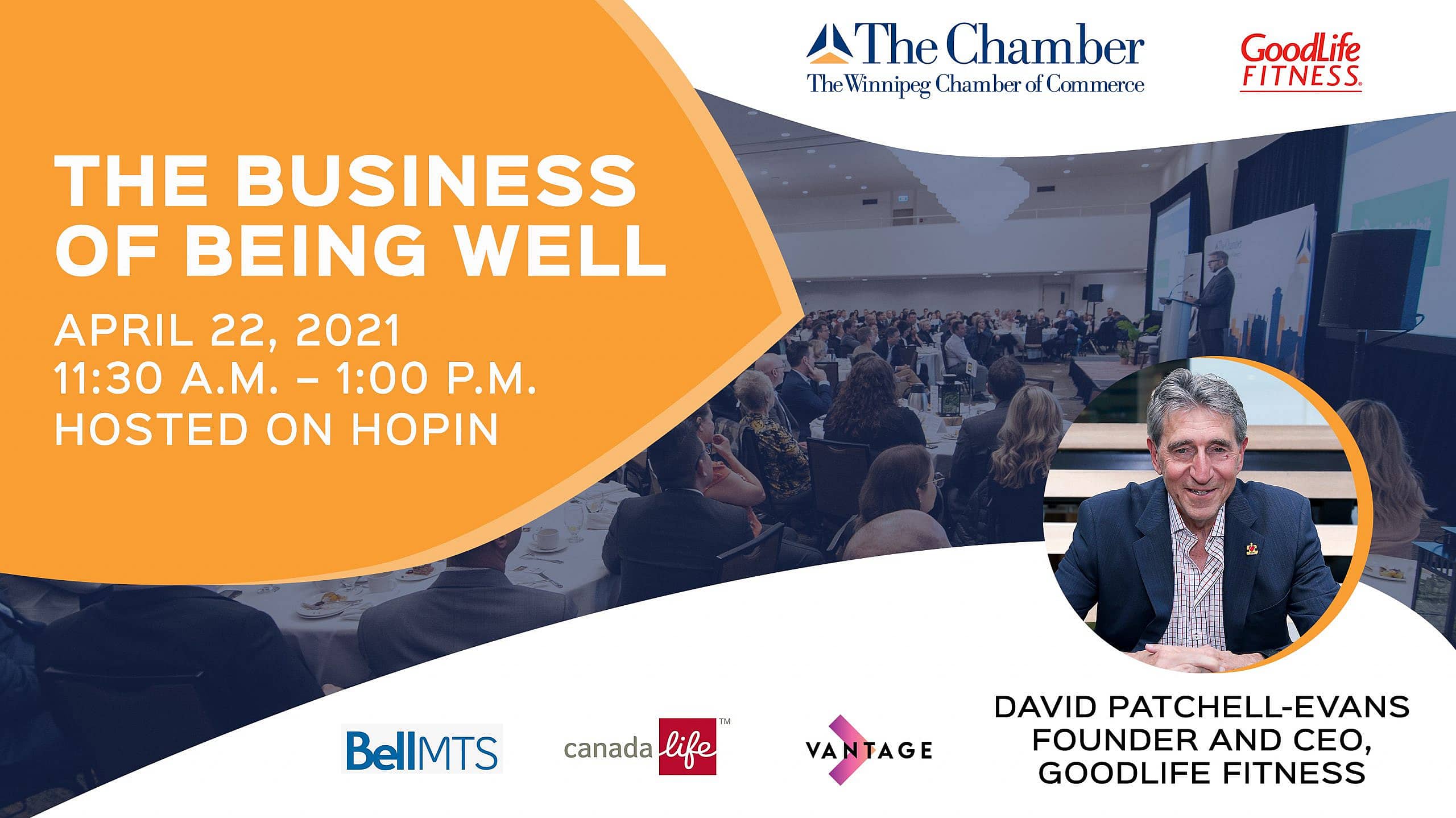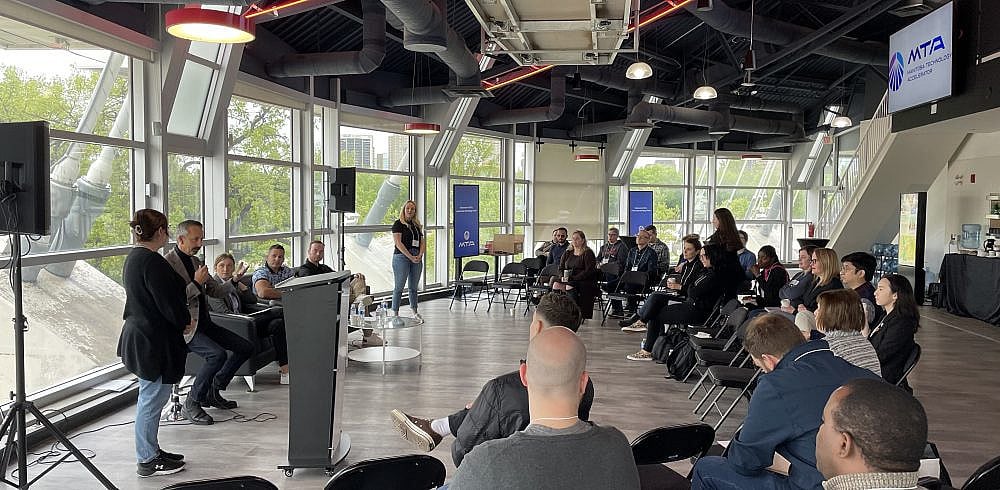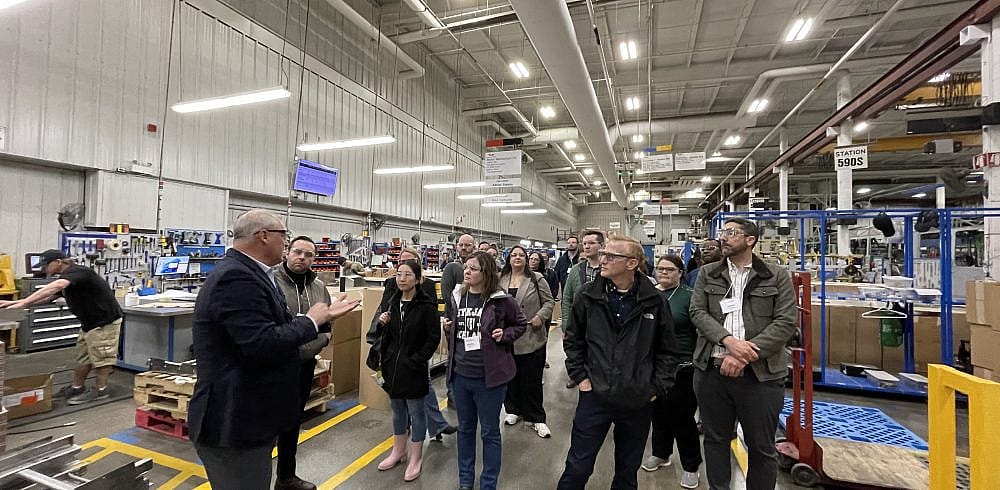We sat down with our April Luncheon keynote, David ‘Patch’ Patchell-Evans, Founder and CEO of GoodLife Fitness, to talk about his career, how the pandemic has impacted the wellness and fitness sector, and what members can look forward to hearing on the business of being well.
WCC: Tell us a bit about yourself and how you got into the physical wellness sector.
David Patchell-Evans (DPE): My commitment to fitness is more than a business, it’s my life’s purpose. Every one of us has different challenges, situations that stress us, change us, and put us up against a wall.
I have faced challenges in my life that taught me, beyond any doubt, that when your body is given all the opportunities to enjoy its natural capacity for movement, the energy reserves you build up help you cope with what life throws your way. In fact, it helps you do more than cope ̶ it helps you thrive.
I call my own personal challenges ‘The 3 As’ ̶ three major events that shaped my life – Accident, Arthritis and Autism.
Accident
When I was in university I broke and tore apart my right arm, shoulder and chest in a motorcycle accident. I was temporarily paralyzed and spent six months in rehabilitation. Exercise played a huge role in my recovery. At the Fowler Kennedy Sport Medicine Clinic in London, Ontario I worked alongside both elite athletes who were training and regular folks who had been injured.
I became enthralled with the ability of exercise to strengthen, heal, and improve one’s quality of life. My business school studies taught me how to successfully run a business but what I wanted to do, was to help people get fit and healthy. I wanted to know everything about exercise, what worked and why. I wanted to get inside a person’s head. What would motivate them to exercise the necessary 2-3 times a week for optimal health?
I switched my studies from business to physical education and kinesiology, graduating from Western University with an Honours Degree in Physical Education in 1977. I went on to get my masters degree in exercise physiology and received an honourary Doctor of Laws degree from University of Western Ontario to acknowledge my achievements as a fitness entrepreneur, his community service and his support of autism research.
I was training for the Olympics at a local gym in London that had nautilus equipment. While working out at the Club for many hours a day, I would ask the owner about his business. I made the decision to buy the club using funds from my snow plowing business….and a whole lot of debt! I came back to the club that night with a case of beer and purchased the club. The next morning, I opened as the new owner. That was 1979.
As I look back I realize that motorcycle accident was a key reason I became a fitness professional and club owner. That’s when I first discovered my passion for making people feel better through physical activity. I experienced first-hand how exercise made me feel better.
Arthritis
When I was 32, I woke up one morning, instantly crippled. I had just finished competing in the World Rowing Championship, performing at the highest level, and the next day my whole body was swollen, inflamed and in serious pain. I was diagnosed with rheumatoid arthritis. I had been an elite athlete, a five-time rowing champion and overnight I couldn’t even turn a doorknob.
When I first tried to go back to exercising, I actually had to have someone turn the pedals of my stationary bike by hand to make the wheels turn. That was quite a blow to the guy who people thought of as ‘Mr. GoodLife Fitness’.
I used exercise to help me mentally cope with the symptoms and to regain physical strength and mobility. To this day, exercise helps me control the arthritis, and there is rarely a day when I don’t exercise.
Autism
When my oldest daughter Kilee was two-and-a-half, she started showing obvious changes in behavior. Her kisses turned into bites, her laughter became whines. She started pushing me away when I tried to hug her. She wouldn’t make eye contact. She was lost in her own world.
I went through a bewildering journey of trying to figure out what was going on. I still remember the devastation I felt upon hearing the doctor’s diagnosis, “Your daughter is severely autistic.”
I was determined to help Kilee become the best she could be. We later found out she also has epilepsy, obsessive compulsive and bipolar personality disorders.
I chose not to focus on her condition but on her potential. I loved her unconditionally. All my energy went into a very intensive home therapy program for her, with a team of trained professionals and volunteers that understood how to help her learn and how to draw her out. Thousands of repetitions to get her to speak one world. Thousands of hours to get her to make eye contact. Years of determination to teach her to tie her shoes.
It’s been unbelievably hard because Kilee has a severe form of autism. At the same time, it’s been unbelievably rewarding because she has made enormous strides in using basic words, socializing and playing sports. I am so proud of her accomplishments. I am also determined to further autism research so hopefully one day other parents and children will not have to experience these same challenges. Kilee’s diagnosis has taught me about the importance of determination, optimism and positive attitude, qualities that have helped me push through.
Over the past 42 years, my purpose has been to give everyone in Canada the opportunity to live a fit and healthy good life. With that consistent goal, we’ve grown the GoodLife group of clubs (including GoodLife, Fit4Less, ÉconoFitness and Oxygen Yoga & Fitness) to the largest group of fitness club chains in Canada and the fourth largest overall in the world. With over 12,000 employees, more than 1.5 million members, and over 400 Clubs, GoodLife Fitness is helping to transform the health and fitness of 1 in 29 Canadians every day.
WCC: You opened your first GoodLife Fitness club in London, ON in 1979. How has the business changed since then?
DPE: When I first started in the fitness business, the industry as a whole did not have a strong reputation. Gyms would open and close quickly and the vast majority of people who worked for gyms were not certified or regulated by a reputable educational body.
My goal as I built the business was to gain the trust of people who simply wanted a healthier more active life by giving them access to fitness professionals who could help them safely and effectively.
I started the Canadian Association of Fitness Professionals (now canfitpro) in 1993 to provide training and certification to fitness professionals and to unite the profession. It has since grown to include more than 25,000 certified fitness professionals and 100,000+ members and organizes major training events for professionals from across Canada and around the world.
When I purchased that first club in London, everybody asked me what I was planning to do differently. I always replied, “I’m actually going to look after people.” Caring for people seemed so simple, but it was so important.
“I’m actually going to look after people.”
Over the years, the fitness industry has grown as more people looks for ways to take better care of their health. The GoodLife team has always looked to take risks and bring in new programs, services and amenities to reach more Canadians.We established the first women’s-only club in 1983 in Peterborough. We were the first and only fitness company to open a club inside a Loblaw grocery store and at the Toronto Pearson Airport. GoodLife brought in the best programs and classes including Les Mills, PEAK and more recently REGYMEN workouts that offer new, innovative and extremely effective approaches to fitness.
The fitness industry has suffered a huge blow during the COVID-19 pandemic, but I am confident it will come back stronger than ever. We’re seeing evidence of this in other countries that are further along the pandemic recovery curve. I also own City Fitness, the largest gym chain in New Zealand. We’ve actually grown our membership, as people return to the gym there with renewed enthusiasm.
People are more aware than ever of how important it is to look after your health. We’ve always been able to work out for free, but people crave a place to exercise where others are there to motivate and inspire them. They also want more choice about HOW they workout. Now there are more options than ever to stay active, whether it’s digital classes and training, outdoor bootcamps or group fitness and workouts in the gym.
WCC: During this past year the global pandemic has in some ways allowed people to find more time for their physical health, while others it was the opposite. How has this past year impacted you personally and your team at GoodLife.
DPE: This has been one of the most challenging years in my life. I have never seen this kind of uncertainty and turmoil in the health and fitness industry. It’s frustrating to see people being denied access to gyms and recreation centres, losing their options to look after their health. Fitness should be a right like medical care, yet it’s been restricted systematically across Canada.
“Fitness should be a right like medical care”
BUT, early in the pandemic I realized that I was no good to anyone as a leader if I was burned out from stress and overwork.
There is a tendency during a crisis to try to solve all the problems, and to work around the clock to try to fix things, or somehow get ahead of the issues. Couple that with the effects of uncertainty the constant stream of negative news.
I started getting up earlier each day to spend time unplugged from my business. Instead, I focused on my mental and physical health through learning, meditating, journaling and healthier habits.
I decided to document my experience in the 21-Day Leaders Guide to Resilience, hoping to inspire and support Associates at GoodLife, as well as other leaders, by suggesting movement, reflection, and self-care practices. It takes 21 days to form a habit. Just following a routine for that long can change your life.
The reality is, people often fall into a “default mode” — maybe one that isn’t productive or is even harmful to your health. Sometimes the things we do to make ourselves comfortable in the short term – like checking emails, monitoring the news, staying up late — make us uncomfortable in the long run.
When it comes to building resilience, healthy habits play a key role. Sleep, water, time away from work to recharge and connect with others, exercise and stretching. Endless studies show that exercise helps your body and mind work better and can boost your mood and confidence. All of these things contribute to resilience.
When you work out regularly, you also benefit from the stability of the routine and a sense of structure and accomplishment. These are building blocks for resilience, and they’re critical to making it through tough times.
I have deep respect and admiration for the Associates in the GoodLife family of companies for how they’ve handled the challenges this year has presented. It has been extremely tough. Associates have demonstrated their true strengths and passion for the company’s purpose. They have consistently gone the extra mile to do whatever they could to support GoodLife during the transition, whether that meant delivering fitness content online, checking in with clients or pushing a project through on tight deadlines. There continues to be a level of trust, ownership and confidence across the company that makes me incredibly proud.
WCC: Why is physical activity crucial in promoting better health for Canadians?
DPE: Before the pandemic, only about one in five Canadians (of any age) were getting the recommended 150 minutes of physical activity per week. Remote work, home-schooling, shelter in place measures and the closure of fitness, recreation and sport facilities and programs are contributing to more sedentary behaviours.
On top of that, anxiety and depression have risen dramatically. Canadians are reporting their highest levels of anxiety and depression – above the levels at the peak of COVID’s first wave.
There is mounting evidence that the lack of access to physical activity and recreation opportunities has put more people than ever at risk of lowered immunity, heart disease, obesity, substance abuse and increased stress and loneliness.
The long-term impact of pandemic restrictions on Canadians’ health is serious. We’re too late to prevent some of the damage, but we can take action now to keep it from getting worse. The solution is physical activity.
Regular exercise reduces the risks of longer-term chronic diseases and we know it also helps address mental health issues by increasing endorphins, regulating sleep and mood and building confidence and a sense of accomplishment. It also helps you sleep better, feel more energetic and be more productive.
The fitness industry leads the way in providing the environment, expertise, accountability and structure Canadians need to live active, healthy lives. Access to health and fitness should be considered a right for people living in Canada, and we have no time to lose.
When you think about what’s happening right now, you realize that a company like GoodLife Fitness has a huge role to play to help Canadians connect with fitness and healthy lifestyles, as well as with each other.
As things change through the pandemic, GoodLife is evolving to delivering as many options as we possibly can – whether it’s virtual fitness classes, workout program suggestions via social media, personal training in the clubs and virtually, group fitness classes.
We’re investing in new programs and connecting with Members however we can to keep them moving and help them stay healthy and optimistic so they can keep enjoying life. That’s what it means to live the good life.
WCC: What can our members expect to learn from you at our upcoming April Luncheon?
DPE: I’m really looking forward to our discussion at the April Luncheon. I plan to share some of my thoughts and experiences around leadership and the importance of self-care, resilience and stress management.
What’s next for the fitness industry and how fitness will figure in our lives, how we manage our health and our ability to come back from the COVID-19 pandemic. I’m going to talk more about how organizations can take better care of their team members when it comes to mental and physical health and well-being and why it’s especially important now, after such a difficult year.
And of course, I plan to share advice for Winnipeg businesses — managing through the pandemic, why I chose to invest in this city and the growth potential this market represents.
It’s going to be a great discussion. See you then!





